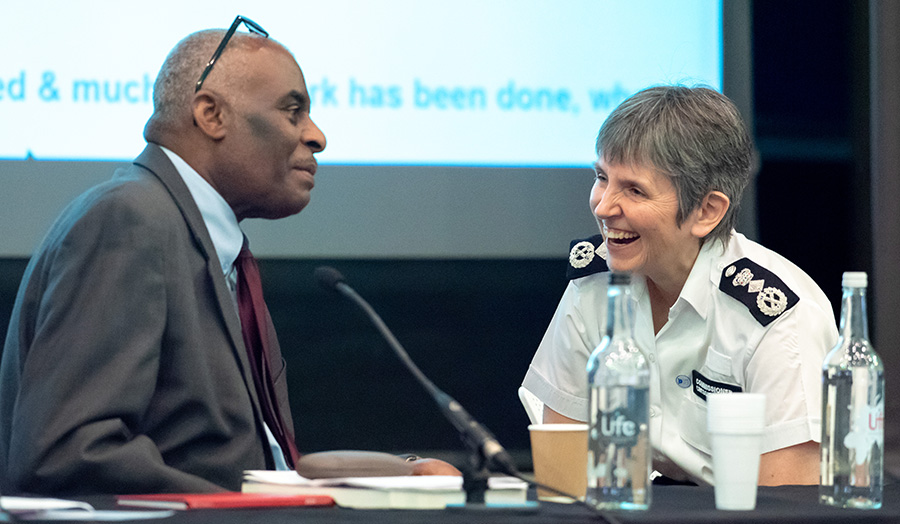Apply for this course
Please select when you would like to start:
If you're a UK applicant wanting to study full-time starting in September, you must apply via UCAS unless otherwise specified. If you're an international applicant wanting to study full-time, you can choose to apply via UCAS or directly to the University.
If you're applying for part-time study, you should apply directly to the University. If you require a Student visa, please be aware that you will not be able to study as a part-time student at undergraduate level.
Why study this course?
On our joint honours Criminology and Law BA degree, you’ll learn about British and European Union law, as well as the methodological and theoretical tools that criminological practitioners use. This is an ideal degree for those looking to work in a range of roles within the criminal justice system and criminology or in sectors where a broad knowledge of the law is useful.
Our law courses are ranked ninth in the UK for teaching quality in the Guardian University Guide 2023.
Third in the UK for student satisfaction
Our law courses are ranked third in London for overall student satisfaction in the Complete University Guide 2025
Boost your career prospects
This is an ideal degree for those looking to work in a range of roles within the criminal justice system and criminology or in sectors where a broad knowledge of the law is useful
Delve into the effects of crime and criminal behaviour
This specialist course will explore the criminal justice system, including the police, judiciary and prisons, examining the concept of justice and sentencing
Course modules
The modules listed below are for the academic year 2024/25 and represent the course modules at this time. Modules and module details (including, but not limited to, location and time) are subject to change over time.
Year* 1 modules
Year 2 modules
Year 3 modules
Administrative Law
This module currently runs:autumn semester - Friday morning
(core, 15 credits)
Administrative Law provides a contextual introduction to some of the central areas of UK Public Law. It provides a detailed examination of the principles of administrative law with particular emphasis on the procedure and substantive grounds for judicial review in English law.
The aims of this module are to provide students with a working knowledge and
understanding of administrative law, and to develop several key transferable skills in this
context, including:
1. A critical understanding of the extent and efficiency of control on governmental
bodies;
2. An ability to apply legal principles to theoretical examples in order to draw
conclusions and give advice to the citizen;
3. To engage in independent research, analysis and academic writing, using both primary and secondary sources of law.
Becoming a Criminologist
This module currently runs:autumn semester - Tuesday morning
spring semester - Thursday afternoon
autumn semester - Tuesday afternoon
(core, 15 credits)
This module will serve as an introduction to university life and has the dual purpose of developing the literacies, discourses and competences needed to become a successful criminologist, while introducing students to the idea of conducting academic criminological research. It will do this by helping you develop your academic skills - such as speed reading, note taking, referencing, paraphrasing and searching for sources. This will be accomplished utilising readings and materials centred on academic research methods.
The module aims to:
1. Introduce you to the discipline and discourses of criminology and what it means to be a criminologist.
2. Build and develop the core academic literacies central to becoming a successful academic and criminologist.
3. Introduce the idea of conducting research into crime and deviance.
4. Introduce different ways in which criminological research can be conducted.
5. Help you settle and adapt to university life, preparing you for your academic studies.
Read full detailsCriminal Law I
This module currently runs:spring semester - Friday morning
(core, 15 credits)
Criminal Law I is a core module for the LL.B. courses and the BA in Law, which introduces students to the key principles of Criminal Law, one of the foundation subjects of English Law, as identified by the professional legal bodies, the Solicitors Regulation Authority and the Bar Standards Board.
The module provides an academic introduction to the fundamental rules of criminal law, including the key principles of a number of criminal offences involving homicide. Criminal law affects many aspects of human behaviour and interaction but has complex definitions.
The aims of this module are as follows:
1. To help students to understand the changing landscape of criminal law as well as some of the major debates in the subject.
2. To teach and assess key skills of analysis, academic writing and legal research in the context of criminal law. It does this by emphasising the use of primary and secondary sources of criminal law, including court judgments, Acts of Parliament, Parliamentary Papers and academic journal articles.
Read full detailsEnglish Legal System
This module currently runs:autumn semester - Tuesday morning
(core, 15 credits)
English Legal System is a core module for the LL.B. courses and the BA in Law, which introduces students to the workings of the English Legal System in its historical, contemporary and international context.
It includes the study of the sources of law; the law-making process; the institutional and court structure; and basic issues of procedure within the English Legal system.
It also enables students to start to acquire the fundamental academic and professional skills necessary for the undergraduate study of law. In this way, it provides a solid support both for the other Level 4 modules, and also for the remainder of the degree course and beyond into professional practice.
The aims of the module are to introduce the following to students:
1. Reflective thinking in the context of contemporary legal issues.
2. A working knowledge of legal language, sources of English law and legal procedure;
3. How to locate legal material;
4. How to read and understand primary and secondary sources of law (paper based and electronic);
5. How to recognise and develop at an introductory level the practical and professional legal skills of advocacy, legal research and legal writing.
Read full detailsIssues in the Criminal Justice System
This module currently runs:summer studies - Thursday morning
spring semester - Wednesday morning
(core, 15 credits)
This module builds on your knowledge of the criminal justice framework to develop a more detailed knowledge of the criminal justice system (CJS) of England and Wales, criminal justice policy, legislation and social justice outcomes by exploring the following contemporary issues:
● ‘Bias’ in the CJS.
● The use of surveillance in the CJS.
● The introduction of private sector providers within the CJS.
● The CJS’s treatment of victims of crime.
● Media representations of crime, victims of crime and agencies of the CJS.
● Developments in crime prevention.
● Recent and current (officially recorded) crime trends.
● Differences in international systems of criminal justice.
The module aims to:
1. Provide you with a solid grounding and overview of these contemporary issues to help you build a more detailed knowledge for levels 5 and 6.
2. Raise your awareness and understanding of the impact of these issues on the criminal justice sector, the delivery of social justice, the service provided to the public by the CJS and public perceptions of the system.
3. Develop your knowledge of historical developments, current policies and significant changes to the CJS.
4. Provide a comparative perspective of other systems of criminal justice.
The Criminal Justice Framework
This module currently runs:spring semester - Friday morning
autumn semester - Wednesday morning
(core, 15 credits)
This module introduces you to the framework and functions of the Criminal Justice System (CJS) of England and Wales. It provides a foundation of the aims and roles of the agencies of the CJS which you can build into a more detailed knowledge of issues in criminal justice, criminal justice policy, legislation and social justice outcomes at levels 5 and 6.
The module aims to:
1. Provide a solid grounding of the context of the criminal justice system within the constitution of the United Kingdom.
2. Identify the theoretical models of criminal justice which will help inform an understanding of the social function of criminal justice systems.
3. Review the historical development, structures and roles of key agencies responsible for the execution of criminal justice in England and Wales upon which you will be equipped to build a grasp of issues relating to criminal justice.
4. Identify significant examples of policy and legislative changes and evaluate how these have altered the functions and inter-agency cooperation of key agencies of the CJS and the wider impact some of these changes have had on social justice.
5. Provide an understanding of the potential future career opportunities available in the criminal justice sector.
Read full detailsThe Development of Criminological Thought
This module currently runs:summer studies - Friday afternoon
spring semester - Wednesday afternoon
(core, 15 credits)
Building on the ideas covered in traditional theories and concepts, you will examine how the discipline of criminology developed. You will explore how criminologists have continued to critique and apply traditional theories in their own explanations of crime. You will explore modern debates about how crime can be understood, and what should be done to address it. You will also explore perspectives which have critiqued the subject of criminology.
Read full detailsTraditional Criminological Theories and Concepts
This module currently runs:spring semester - Friday afternoon
autumn semester - Wednesday afternoon
(core, 15 credits)
In the module you will be introduced to origins of criminological thinking, through an exploration of some of the key thinkers who shaped the discipline’s development and created theories to explain and understand crime. You will develop an understanding of the social context in which relevant theories emerged, be able to recognise their limitations, and some of their biases. You will also be able to recognise the policy implications of the theories you explore, as well as their enduring influence on policy and criminological research.
Read full detailsAnalysing Crime Narratives
This module currently runs:spring semester - Wednesday afternoon
spring semester - Wednesday morning
(core, 15 credits)
The module explores qualitative methods which are deployed as a way of understanding criminals and the phenomenon of crime in more flexible ways than those permitted by the collation of crime statistics. The utility and justification of qualitative research methodologies is critically considered and you have the opportunity to develop a variety of practical research skills, from conducting a qualitative interview to analysing qualitative data using NVivo and writing research reports. This module aims to develop your knowledge of qualitative research methods and ability to apply them in practice to enhance your future employment opportunities.
Read full detailsAnalysing Crime Statistics
This module currently runs:autumn semester - Wednesday afternoon
autumn semester - Wednesday morning
(core, 15 credits)
This module takes you through the research process in relation to quantitative methodologies from the formulation of a research problem through appropriate collection and analysis of data to the writing-up of results in the form of a research report. The module sets out the research contexts in which this methodology is appropriate and discusses the skills and limitations associated with surveys as an important research method in criminology. At the same time, the module introduces you to the Crime Survey England and Wales as one of the main quantitative data sets on crime in the UK.
Read full detailsBecoming a Criminal Justice Professional
This module currently runs:spring semester - Friday morning
(core, 15 credits)
The aim of this module is to encourage professional development. The module is delivered via small group workshops which focus on the development and/or strengthening of your professional profile in preparation for future job applications. You will also develop/strengthen your knowledge and understanding of potential roles within the criminal justice sector and consider how to match some of the skills/qualifications required by employers with those you have developed during your degree and previous work/study experience. The knowledge, skills and understanding gained via this module will be useful for those who intend to seek employment within the criminal justice sector.
Via the workshops, reading and discussions:
1. You will develop an understanding of key roles within the criminal justice sector.
2. You will be encouraged to develop your professional profile (CV, LinkedIn, cover letters, interview performance etc).
3. You will consider how to match your skills to criminal justice employers’ requirements.
4. You will be encouraged to consider your career aspirations and to develop the skills and confidence to pursue them.
Criminal Law II
This module currently runs:autumn semester - Tuesday afternoon
(core, 15 credits)
Criminal Law II is a core module for the LL.B. courses and the B.A. Law, which builds on the knowledge and skills acquired in the study of the LL4057, Criminal Law I. Students study further key principles of criminal law, which is one of the foundation subjects of English law, as identified by the professional legal bodies, the Solicitors Regulation Authority and the Bar Standards Board.
The aims of the module are as follows:
1. Students will acquire knowledge of the basic principles of defences; violent offences; and property offences in criminal law.
2. Students will develop several key transferable skills, including independent research, critical analysis and cogent academic writing in the context of criminal law, emphasising the use of primary and secondary sources.
3. Students will enhance their employability by the development both of these skills, and by the practice of written communication activities (including summative) and oral communication activities (formative only).
Read full detailsCrime Prevention and Environmental Design
This module currently runs:autumn semester - Thursday morning
(option, 15 credits)
This module begins by offering a discussion about the complexity of defining crime prevention and how this concept involves the consideration of many sectors (including that of education, urban planning, public policy and of course, criminal justice). From this broad starting point, the module explains the key concepts in crime prevention (crime control, crime reduction, and community safety). The module then discusses different types of crime prevention including that of: developmental crime prevention, community crime prevention, situational crime prevention, law enforcement / criminal justice crime prevention and crime prevention through environmental design (CPTED). In examining these varying forms of crime prevention, the module draws upon contemporary environmental criminological and psychological research as well as real-world case studies from across the world. An emphasis throughout the module is ‘what works’ in preventing crime. In doing so, the module offers an acute investigation of the evidence that supports the claim that the built environment can be designed to prevent crime. The module also advances critical discussion of the limits and problems of crime prevention approaches (such as that regarding displacement and diffusion effects as well as net-widening and ethical problems surrounding pre-crime monitoring).
Read full detailsCrime in Context
This module currently runs:autumn semester - Thursday afternoon
(option, 15 credits)
In this module you will explore concerns about crime and criminals within their historical and social context, and consider how these change over time. In doing so you will explore how social reactions to crime can be understood using a constructionist approach, involving the construction of ‘others’.
The central themes revolve around why some behaviours and some groups of people are ‘constructed’ as the focus of concern and special treatment. Equally, it considers why some crimes, such as corporate crime, or state crime, usually receive less attention. This exploration encourages reflection on how and why certain behaviours are defined and constructed as ‘crime’, and ‘social problems’.
Read full detailsCrime, Media and Technology
This module currently runs:autumn semester - Friday afternoon
(option, 15 credits)
This module looks at the media impact on public perceptions of crime and justice. It also looks at the way contemporary media and technologies influence criminal behaviour and influence the operations of the criminal justice system.
The module aims to:
1. Consider the various relationships between media, technology and crime.
2. Develop an understanding of the role of the media in shaping perceptions of crime and criminal justice, with a particular emphasis on marginalised groups.
3. Develop a critical awareness of how different groups are represented in the media with regard to crime, criminality and deviance.
4. Provide an overview of the way technologies interact with crime and the criminal justice system.
6. Develop summarising and analytical skills.
Crimes of the Powerful
This module currently runs:autumn semester - Friday afternoon
(option, 15 credits)
The aim of this module is to explore the range of crimes committed by the powerful, such as white-collar, state, corporate and environmental crime, and the level of harm they cause to societies and economies. Traditionally, criminal justice systems and criminology as a discipline, have focused on the crimes committed by the most disadvantaged and powerless members of society. Crimes committed by powerful individuals or organisations have not faced the same level of attention and scrutiny. This is despite the fact these crimes are often very serious and contribute to more injuries, deaths, financial loss and social harm than ‘conventional’ crimes.
In this module you will gain a critical understanding of the key concepts, theories, and issues, past and present, in relation to crimes committed by the powerful. You will be encouraged to actively participate in discussion and debates linked to key themes and given opportunities for reflective learning. You will develop the skills to investigate, critically examine, and present detailed analysis of current case studies of crimes committed by states, corporations and powerful individuals. In this module, you will also gain an understanding of the difficulties experienced when trying to regulate, investigate and research these crimes. As part of your assessment, you will be required to create a ‘campaign for social change’ file related to crime committed by powerful entities. You will develop transferable skills in oral and written analysis, independent learning, reflective learning and group-work which will help in future professional practice or postgraduate study.
Read full detailsCriminological Research in Context
This module currently runs:spring semester - Tuesday afternoon
(option, 15 credits)
The aim of this module is to encourage the development of knowledge, skills and understanding for criminological research and the types of methods which are adopted within the field. Via small group workshops you will focus on the development and/or strengthening of your knowledge in relation to key social science research methods/ theory which might be applicable to UG/PG study in the field of criminology and associated subject areas. You will be encouraged to consider how research methods, theory, and the specific studies explored within the module, might be relevant to your own ideas/plans for your final year criminology research project. The knowledge, skills and understanding gained via this module will be useful for those who are interested in conducting criminological research.
Via the workshops, reading and discussions:
a. You will develop an understanding of a range of key social science research methods/theory.
b. You will develop your knowledge and understanding of a range of criminological research/studies and consider the significance of research findings in terms of the contribution to knowledge and/or the impact that research findings can have upon policy/practice within the criminal justice sector.
c. You will develop the skills to critically review criminological research/articles. As you do this you will also be encouraged to reflect upon your own ideas for your final year research project and the method/s you might adopt to study a criminological topic of your own choosing in the final year.
Read full detailsCriminology Today
This module currently runs:spring semester - Thursday afternoon
(option, 15 credits)
In this module you will build on the themes explored in crime in context by examining contemporary themes in criminology. This will involve an introductory examination of different categories of crime which have become the focus of attention and concern. You will critique perspectives on different categories of crime by exploring and evaluating the evidence gathered by criminologists. You will also explore different theoretical understandings of specific categories of crime and consider their policy implications.
Read full detailsCybercrime and Surveillance
This module currently runs:spring semester - Thursday morning
(option, 15 credits)
This module will look at the dark side of technology and the way it has transformed criminal activities. It will engage with the different types of cyber-crime and strategies to combat them, including the challenges of policing the internet, especially when it comes to crimes taking place across different jurisdictions. The second part of this module will analyse e-surveillance, through critically examining how our daily transactional data are managed, particularly in regards to right to privacy versus security issues, as well as the exploitation of personal data for corporate purposes.
The module aims:
1. To provide an overview of the main issues in the field of cybercrime, through the analysis and evaluation of the academic research.
2. To critically explore the challenges of researchers and practitioners investigating cybercrime.
3. To evaluate the advantages and disadvantages of e-surveillance, while analysing the ways in which the stored transactional data is being used by law enforcement bodies and corporations.
Read full detailsDark Destinations - Crime and Tourism
This module currently runs:autumn semester - Tuesday afternoon
(option, 15 credits)
This module looks at ‘dark tourism’- a term most commonly used to describe tourist activities in places that are associated with death and suffering, or activities carried out by tourists that are deviant, illegal or have associated harms. Along with highlighting the historical events that inspire dark tourism, the module will take a look at the underlying harms and crimes that are often still perpetrated, affecting both consumers and people who work in tourism or live close to tourist hotspots.
The module aims to:
1. Identify and explore crime and deviance related tourism.
2. Introduce you to global historical crimes and harms which have inspired contemporary tourist activities.
3. Allow you to investigate the underlying harms and crimes that occur in relation to tourism hotpots.
4. Encourage you to consider the reasons behind the publics’ fascination with dark tourism.
5. Explore how both consumers and local people are impacted by dark tourism.
Read full detailsDrugs and Drug Policy
This module currently runs:spring semester - Friday afternoon
(option, 15 credits)
The aim of this module is to provide you with a critical understanding of drug use, the drugs trade and drug policy from legal, cultural, criminological, public health and human rights perspectives. You will acquire an understanding of drugs theories and concepts and learn to apply them to a range of social and cultural contexts. The module will enable you to develop an understanding of the social, cultural and economic factors that influence substance use and drug related offending. It will also provide you with a critical understanding of the historical, political, social and economic factors shaping the drug-crime nexus, the drugs trade and enforcement strategies. In an analysis of the origins and history of drug policy and through its development you will also gain knowledge of the ways in which drug control and regulation is conducted along racial, gendered and class lines, and the social costs and ‘collateral damage’ of the drugs’ war.
You will be provided with the critical tools to formulate and defend, orally and in writing, evidence-based arguments on key issues in the drugs field on topics such as the legal-illegal divide, the impact of the global prohibition regime, drug harms, treatment and welfare, drug functions and freedoms and questions of identity, consumption, and risk. You will be given the opportunity and critical tools to evaluate a contemporary drug policy. You will also be given the opportunity to critically appraise the assumptions underpinning discourses on drugs and drug policy and criminal justice and treatment responses. You will gain knowledge of drug laws, criminal justice as well as treatment policies and practices, providing you with the knowledge and understanding for working competently with substance users and drug offenders in criminal justice, health and social care, and advocacy roles.
Read full detailsLaw of Evidence
This module currently runs:autumn semester - Friday morning
(option, 15 credits)
The Law of Evidence is a core module for the LL.B. Criminal Law (Hons). It is an optional module for the other LL.B. courses; the B.A. Criminology and Law;
and the B.A. in Law.
The Law of Evidence concerns the information which it is permitted to use to enable the claimant or prosecution to establish their case against a defendant, or to enable the defendant to refute the allegations made against him.
It is not every supposed fact that may be brought in evidence in a trial, as the court has limited time and resources to hear everything – however trivial – that the parties might wish to throw into the debate, and there are a host of issues relating to such matters as unfairness or undue prejudice (especially to the defendant in a criminal case), mistakes, unreliability of witnesses, human rights and public policy which might impact on the propriety of permitting certain statements or documents to be admitted as evidence.
This module examines the rules and ethics of the law of evidence, which have arisen both at common law and under statute, and invites to students critically to analyse these principles both in a theoretical context, and by practical application to realistic case-studies.
The aims of the module are as follows:
1. Students will acquire knowledge of the rules and ethics of the law of evidence, which have arisen both at common law and under statute.
2. Students will develop several key transferable skills, including independent research, critical analysis and cogent academic writing in the context of land law, emphasising the use of primary and secondary sources;
3. Students will enhance their employability by the development both of these skills, and by the practice of written communication activities (including summative) and oral communication activities (formative only).
Read full detailsLegal Research Methods
This module currently runs:spring semester - Thursday afternoon
autumn semester - Thursday afternoon
(option, 15 credits)
Legal Research Methods, which is offered in both the autumn and spring semesters, provides a detailed understanding of how to prepare for writing a dissertation or thesis on a legal topic.
Students will be given practical guidance on how to conduct advanced legal research from both primary and secondary sources; how to choose a viable research topic; how to write a research proposal; how to conduct a literature review; and how to choose the right methods and methodology for the dissertation.
In doing this, the students will be preparing themselves for conducting legal research in both an academic and professional field, as well as for writing a research dissertation at Level 6.
The aims of the module are as follows:
1. Students will acquire advanced knowledge of how to conduct independent legal research and how to organise, assemble and synthesise large amounts of legal material in order to identify legal problems.
2. Students will develop several key transferable skills, including independent research, critical analysis and cogent academic writing in the context of writing a research dissertation, emphasising the use of primary and secondary sources.
3. Students will enhance their employability by the development both of these skills, and by the practice of written communication activities (including summative) and oral communication activities (formative only).
Read full detailsPerspectives on Policing
This module currently runs:autumn semester - Friday morning
(option, 15 credits)
The module aims to familiarise you with specialist policing operations by reviewing different perspectives (e.g. practical and academic) on a range of policing interventions. This involves exploring the development of policing strategies and procedures in a variety of specialist areas and also examines legislative developments.
Ethical dilemmas and the ways in which they are confronted and resolved in policing are also assessed via the workshops, reading and discussions:
1. You will examine aspects of contemporary specialist policing from both practical and academic viewpoints.
2. You will critically explore the operational challenges and ethical dilemmas inherent in specialist police operations.
3. You will draw upon recent case studies and examine actual operational scenarios to critically assess the effectiveness of the police response to crime, victims and offenders in relation to specific crime types.
4. You will develop your team working skills and your ability to research, analyse, and communicate (orally and/or in writing) information and evidence-based arguments relating to ‘real world’ contemporary policing issues.
Working with Offenders
This module currently runs:autumn semester - Tuesday morning
(option, 15 credits)
This module offers you the chance to understand the current debates and practices around working with offenders. The module will cover working with children involved in offending behaviour as well as adults and is ideal if you are considering working within youth justice, probation or voluntary sector organisations working with those with offending backgrounds. You will explore debates around enforcement, risk management and public health approaches within the criminal justice sector. A key focus of the module will also be on your understanding how discrimination (including individual prejudice) affects people's experience of the criminal justice system and how to work in an anti-oppressive way.
The module aims are as follows:
● Understand the role of the youth justice system, probation service and voluntary sector organisations when working with offenders.
● Discuss and evaluate the effectiveness of enforcement, public health and risk managements approaches to offender management and crime prevention and desistance.
● Support you to understand risk factors associated with offending.
● Explore the importance of trauma informed practice within the criminal justice system.
● Assess the impact of discrimination on disproportionality and the role of anti-oppressive practice.
● Understand the role of assessment and reporting when working with those involved in offending.
Youth Resistance and Social Control
(option, 15 credits)A1. To provide students with a historical, theoretical and comparative understanding of the diverse forms of youth culture and youth social organisation;
A2. To consider the key developments in political mobilisation of young people;
A3. To investigate the concepts and nature of social control in relation to youth;
A4. To develop confidence in use of appropriate learning, analytical and discursive skills when dealing with current youth issues.
Youth, Crime and Violence
This module currently runs:spring semester - Friday afternoon
(option, 15 credits)
Academic authors have shown that for centuries adults have expressed concerns about the anti-social and criminal behaviour of young people. In recent times, this concern has centred on rising levels of violent crime by young people and the burgeoning ‘gang, gun and knife crime culture’ in the UK. You will critically examine young people’s involvement in crime and violence.
This module examines key theories for understanding violence by the young and explores the connection between violent behaviour and a variety of social issues such as peer pressure, gender, ‘race’ and ethnicity, and alcohol and substance misuse. This highlights the impact of changing economic, political and cultural contexts from the global to local.
Module aims:
1. Familiarise you with the theoretical perspectives that have shaped criminological thought on violence by young people.
2. Encourage you to develop a critical overview of young people’s engagement in violent crime.
3. Develop your ability to research, analyse and communicate critical and informed arguments relating to the theory, policy and practice underpinning youth involvement in violent crime.
Criminal Litigation
This module currently runs:spring semester - Friday morning
(core, 15 credits)
Criminal Litigation provides students with an understanding of criminal litigation in a legal practice context. The course introduces students to the criminal litigation process, including the role and powers of the police in relation to stop and search and arrest, the role of the CPS in charging and prosecuting an offender and the structure and jurisdiction of the criminal courts. The module also introduces students to professional conduct rules in a legal practice context.
The module aims to develop several key transferable skills including independent research, critical analysis and written and oral presentation skills in the context of a practical legal subject. It also aims to give students an insight into the practical aspects of law which is particularly valuable if they are contemplating a career in legal practice.
Student employability will be enhanced by the development both of these skills and also by gaining expertise in answering situational judgment, multiple-choice questions, such as are typical in professional legal assessments such as the Solicitors Qualifying Examination and some Bar Practice courses.
Read full detailsCriminology Project
This module currently runs:all year (September start) - Wednesday afternoon
(core, 30 credits)
The overall aim of this module is to equip you with the knowledge and skills to design and conduct an independent criminological research project, and to produce a written research report. This gives you the opportunity to demonstrate your knowledge and understanding of criminological theory and its application, of the quality and significance of criminological research evidence, and the relevance of your research to contemporary issues and debates in criminology and criminal justice fields.
The module aims to:
- Give you the opportunity to reflect upon your learning, your experience, and the skills you have acquired to date, to independently define and research a criminological topic which is of interest to you.
- Further develop your research skills, encouraging you to formulate feasible criminological research questions, to select appropriate quantitative/qualitative methods, and to reflect upon ethical issues which arise in research.
- Give you the opportunity to produce a written research report which demonstrates your knowledge, understanding and skills for conducting criminological research, recognising the relationship between criminology and related fields as well as the limits of knowledge.
Penal Policy
This module currently runs:spring semester - Thursday afternoon
(core, 15 credits)
This module provides an introduction to theories of punishment from a criminological and sociological standpoint. It also deals with aspects of sentencing practice and procedure and allows students to participate in sentencing simulation exercises and debates. Certain categories of offender (e.g. young offenders, women) are considered in depth. Finally, the issue of penal reform, including restorative justice, is addressed in the light of the most recent initiatives in the field.
The course includes:
• an introduction to theories of punishment and their historical roots with an emphasis upon critical discussion of the conceptual positions that underscore the system.
• an introduction to the range of sentencing options available to the courts and an awareness of the considerations that confront sentencers in making sentencing decisions.
• techniques for the presentation of arguments relating to sentencing
• a discussion of the institutional experiences of different categories of offenders in a range of penal institutions
a general discussion of the possibilities for reform of the penal system
Read full details'The Deviant Other' - media representations of crime
(option, 15 credits)This module looks at the way crime and deviance is represented in the media and interrogates the reasons behind these representations. The module will focus on different forms of media – both traditional and modern, and examine the way crimes and groups labelled as ‘other’ are presented to the public.
The module aims to:
- Focus on how different crimes are represented in the media
- Develop an understanding of how ‘deviant others’ are represented in the media
- Critically analyse how the media shape perceptions of groups or individuals labelled as ‘other’
- Consider the reasons behind the media representations of crime, criminality and deviance
- Analyse different forms of media, both factual and fictional
Civil Liberties and Human Rights
This module currently runs:autumn semester - Tuesday morning
(option, 15 credits)
Civil Liberties and Human Rights gives a clear, coherent and up to date account of the law of human rights and civil liberties, concentrating on the position of civil liberties and human rights protection in the light of the Human Rights Act 1998 and the standards of human rights protection laid down in the European Convention on Human Rights
It introduces and builds up critical understanding of the legal concepts which govern individual and collective rights and responsibilities, including the constraints the state may place on the citizen’s exercise of his or her human rights.
The module aims to develop several key transferable skills including independent research, critical analysis, legal drafting and academic writing in the context of the law of civil liberties and human rights, emphasising the use of primary and secondary sources of law. It will encourage and enable students to develop a sophisticated understanding of the relationship that exists - in terms of specific individual rights and freedoms - between the State and the citizen in the UK today and how the legal, social and political conflicts and tensions which are intrinsic to that relationship influence policy, decision-making and legislation.
Student employability will be enhanced by the development both of these skills and by
the practising of written and oral communication skills and group participation skills.
Criminal Law Extended Essay
This module currently runs:spring semester - Monday morning
autumn semester - Monday morning
(option, 15 credits)
The Criminal Law Research Essay module requires the students to undertake detailed, critical research into a criminal law topic of their choice and write a research proposal (500 words) and a research-based essay (1,500 words).
Students are assigned a supervisor based on their choice of topic.
The module is structured so that students are required to present an assessed research plan, which then provides the infrastructure for their essay. Students are expected to engage with regular supervision throughout the process.
Students will develop an advanced understanding of their chosen specialist area of criminal law.
The aims of the module are to:
• allow students independently to research and develop an expert understanding of an area of criminal law of their choice;
• improve both the research and independent study skills of the students;
• enhance the ability of students to develop critical arguments
By researching their chosen area of criminal law, students will be equipped with specialist skills and knowledge, to help them stand out in the job market.
Criminology Work-Based Learning
(option, 15 credits)This module provides an opportunity for you to develop your previously learned work-based skills and gain valuable experience of a working environment either in the
criminal justice sector or in a private, statutory or voluntary organisation related to criminal justice and criminology. From this experience, the objective is for you to reflect and develop new capacities and skills in the context of your future goals. This objective also applies if you are currently in the workplace, whether in a paid or voluntary capacity.
The module aims to:
- develop key skills and knowledge for you to understand your abilities in relation to your career values and goals
- practically apply the knowledge gained through the course programme to a work environment
- give you an in-depth insight of a work environment
- provide an opportunity for you to reflect on the culture and structure of a working environment, your activity within it and to demonstrate inclusive workplace practice
- 5. give you the ability to recognise your personal and professional development learning to apply to your future goals.
Please note:
- You will be contacted prior to the semester to provide support in securing a work based placement in good time.
- You are responsible for applying for opportunities and to engage with the Module Leader/Work Based Learning teams to assist you.
- The suitability of any opportunities will be assessed by the Module Leader and all placements must meet Health and Safety requirements for Higher Education Work Placements.
- If you are studying on a Student Visa, you will only be able to complete a work placement if it meets UKVI monitoring requirements including: approval of the placement dates and hours by the Placement Officer prior to starting the placement, submission of weekly timesheets for the hours undertaken, signed by your line manager/supervisor and continued engagement with the Placement Officer as well as the International Student Support and Compliance Team.
Criminology of Pleasure
(option, 15 credits)The aim of this module is to explore a range of pleasures that have throughout history been subject to varying levels of regulation and social control via criminal justice policy/practice. You will critically consider changing perceptions in relation to a range of pleasures and desires (e.g. drugs, pornography, graffiti, gambling etc). The module is delivered via workshops which begin by exploring illicit pleasures and the legal and social responses to such acts. Key theoretical concepts and schools of thought within the field, such as cultural criminology, will be explored.
Via the workshops, reading and discussions:
a. You will explore a range of illicit pleasures and assess historical/contemporary legal and social responses to such acts.
b. You will consider the changing perceptions/moralities regarding pleasures that might also be regarded as harmful/criminal.
c. You will develop your understanding of key theoretical concepts and schools of thought within the field.
d. You will develop your ability to research, analyse, and communicate thoughts relating to crime/pleasure and its control.
Environmental Justice
(option, 15 credits)This module will delve into the key issues of eco-criminology, also known as green criminology, such as deforestation, environmental toxic waste, wildlife crime and the trade on endangered species. It will explore the dynamics between corporate environmental crimes and the victims, often small communities, in shaping environmental justice. This module will also evaluate the regulations, policies and laws that address environmental harms, such as setting restrictions on the type and amount of pollution a company can emit, including the challenges and dilemmas that policymakers encounter. Furthermore, this module will explore how breaches of these policies/regulations and laws are handled at a local, and at a global level, in developed and developing countries, as well as the challenges of a common action at a global level to eliminate the unequal distribution of environmental harm.
The module aims:
- To provide you with an outline of the key concepts and challenges in the research of green criminology
- To evaluate the main theoretical debates, and how law enforcement bodies deal with green crimes, especially when victims happen to be non-humans
- To critically analyse the challenges that researchers and law enforcement bodies encounter when investigating environmental crimes.
Gender and Crime
(option, 15 credits)The module investigates the relationship between gender and crime, and unpacks the debate on the individual as criminal or victim (sometimes both). You will examine the relationships between gender and crime, looking at a range of topics including gendered violence, female offending, masculinities and crime, sex crimes, sex work and sex trafficking, women drugs and drug trafficking, and media and crime. You will also consider key issues in current criminal justice policy and practice related specifically to women both as both victims and offenders drawing on feminist theories of crime.
The module aims:
● To critically examine the gendered nature of crime
● To understand the theories of gender and crime
● To explore key issues in current criminal justice policy and practice related specifically to women both as both victims and offenders
● To assess the differential impact of violence on and potential of crime prevention.
Global Crime and Disorder
(option, 15 credits)The aim of this module is to provide you with a critical understanding of the historical, conceptual, and theoretical ideas fundamental to the study of crime and criminal justice in a contemporary global context. You will acquire knowledge of conceptual and theoretical frameworks such as globalisation, neoliberalism, securitization, and global inequalities through which global crime and disorder can be interpreted and analysed. In this module, you will explore how the quest for order in the name of crime control and risk management contributes to dis-order; the way political discourse and the mass media manufacture global disorder and risk; and the ways state actors are often complicit in transnational crime and global dis-order.
You will be provided with the analytical tools to critically appraise global criminological and social justice problems such as migration, the rise of the right, terrorism, global drug crime, ecocide, and modern slavery, and criminal justice policy responses. The module will help you to develop your ability to communicate coherently and clearly, orally and in writing, and present and defend cogent arguments in relation to global issues. You will carry out an investigation of a social justice movement as part of your assessment. The module will provide you with the knowledge and competencies useful for future employment in international justice organisations, intergovernmental organisations, policy making, as well as for postgraduate study. This wide-ranging module utilises research-informed teaching to help you develop an outward looking, reflective and critical approach to crucial current global issues.
Migration, Borders and Control
(option, 15 credits)The aim of this module is to investigate the complex relationship between migration, crime, borders and the criminal justice system. In this module, you will discuss the management of migration, focusing on the control of borders and the processing of migrants. You will examine the relationships between migration, borders and crime, looking at a range of topics such as forced migration, migrant smuggling, policing migration and borders, imprisoning foreign nationals, immigration detention, deportation and human rights, drawing on theoretical work and empirical research in a range of disciplines.
The module aims to:
- Critically examine the complex relationship between migration, borders and crime
- Understand and explain key concepts such as national sovereignty, citizenship, globalisation and migration
- Understand some of the theories emerging from recent research on migration, borders and crime.
- Explore diverse forms of border policing and crime control.
- Assess the differential impacts of migration control on particular groups (e.g. gender/nationality/race/ethnicity, class)
Organised Crime
(option, 15 credits)This module explores the social, economic and political issues associated with the emergence and illicit activities of organised crime. It will delve into the different definitions and types of organised crime, such as mafia, cartels, syndicates and gangs.
The module will also provide a brief overview of the historical context and the main theories and research in the field. At the same time, it will explore the practical implications of policing organised crime, especially when it comes to its increasingly transnational nature.
This module also looks at the criminal activities of organised crime, including human/drugs/arms trafficking, cybercrime, and the push and pull factors that influence the mobility of organised crime groups across territories.
The module aims:
1. To analyse prominent research and theoretical underpinnings in the field of organised crime
2. To critically explore the main facets of organised crime groups and illicit activities
3. To outline the key challenges encountered by those who investigate organised crime, i.e. academics and practitioners
Policing Strategies and Investigations
(option, 15 credits)The aim of this module is to evaluate a range of policing strategies and investigative techniques in the UK. You will gain a critical knowledge and understanding of the key concepts, issues and practical considerations in criminal investigation. A review of miscarriages of justice and their consequences for the criminal justice system will frame an appraisal of the reforms made through legislation and codes of practice to improve investigative procedures and policing practices. You will acquire the conceptual tools to critically evaluate the impact of legislative reforms (e.g. PACE) on every day policing practices. You will consider questions of ethics, police culture, effectiveness, efficiency and public confidence alongside policing strategies (e.g. investigative interviewing, decision making, crime scene preservation, intelligence-led and covert policing). You will further consider these questions in the scrutiny of a number of public inquiries (e.g. Byford and Macpherson), and in an evaluation of police accountability systems.
On this module you will develop desirable skills required for effective police work including the ability to understand and interpret legislation, procedural guidelines and codes of practice relevant to criminal investigation; incorporate questions of ethics, public trust and accountability into investigative practice and decision making; communicate well with peers; and research, collate and organise information from a variety of sources, and present it in a coherent and concise way for information and peer review. The assessment will require you to carry out a critical evaluation of an investigative strategy or issue using a case study for peer review. You will conduct a peer review of another student’s evaluative piece.
Punishment and Prison
(option, 15 credits)The module will focus on critical consideration of the principles of punishment and the role of imprisonment in the criminal justice system and wider society. Looking at prisons within a ‘real world’ context, issues with penal policy and practice will be considered. The needs of specific minority and vulnerable groups of offenders (including women, young people, ethnic minority and mentally disordered offenders) will be considered. Comparative penal perspectives will be explored by considering a number of international perspectives, including the American/Scandinavian examples.
Via the workshops, reading and discussions you will:
- Develop an understanding of the aims and principles of punishment and prisons via an exploration of the operation of prisons and the role of imprisonment within the criminal justice system and wider society.
- Explore comparative penal perspectives and develop understanding of diversity within penal policy and practice.
- Enhance analytic skills and critical awareness through consideration of both official rhetoric and evidence together with the limitations of penal policies and practice in a 'real world' context.
- Develop your ability to research, analyse, and communicate arguments relating to punishment, penal policy and practice.
Serious and Serial Offenders
This module currently runs:autumn semester - Thursday afternoon
(option, 15 credits)
ou will explore the definition, characteristics and offending behaviour of serious and serial offenders, with a particular focus on mass, spree and serial murderers, sexual offenders and arsonists. You will also consider how such offenders are investigated, their behaviour and characteristics analysed. Key explanatory theories used to explain serious and serial offending will be examined and the efficacy of these in relation to methodological concerns critically evaluated. Finally, the module explores the identification and apprehension of serious and serial offenders.
The module aims to:
1. discuss and give examples of some of the most disturbing and controversial forms of offending behaviour;
2. identify the prevalence of serial and serious offending within the broader population of criminal offences, questioning common assumptions about, and contemporary popular focus on, these categories of offences;
3. evaluate and debate the definition and measurement of serious and serial offending, particularly in relation to methodological concerns;
4. describe and critically discuss a range of key theories and concepts employed in the explanation and understanding of serious and serial offenders;
5. critically evaluate the investigation and detection of such offenders and offences.
Terrorism and Counter-Terrorism
This module currently runs:spring semester - Thursday afternoon
(option, 15 credits)
The aim of the module is to examine the debate over of the origin of a variety of forms of ideological, nationalist and religiously motivated violence in the form of 'terrorism'. You will examine the contemporary range of counter terrorist agencies and policies in the national and international context. You will develop a deep critical understanding of the ways in which meanings are constructed and how these impact on social life.
Read full detailsVictims and Crime
This module currently runs:autumn semester - Tuesday afternoon
(option, 15 credits)
The aim of this module is to encourage you to develop a meaningful understanding of the experiences of victims of crime within the criminal justice system and beyond. The module is delivered via workshops which begin by exploring the notion of victimhood and critiquing the ways of understanding the impact and extent of victimisation for a diverse range of crime victims. You will consider the ways in which we identify and respond to victims of crime. You will study the development of victimology as an academic discipline and the key theoretical concepts within the field. More broadly, you will explore the social, political and cultural contexts which influence our understanding of and responses to victims of crime. Via workshops, readings and discussions you will also
critically explore and analyse the development of victim-centred policy and practice
within the criminal justice system and beyond. This knowledge and understanding will be useful for those seeking to work with and/or advocating for victims of crime.
Via the workshops, reading and discussions:
a. You will develop an understanding of the key theoretical concepts within victimology.
b. You will identify some of the social and political factors that placed victims at the forefront of academic and professional discourses.
c. You will explore the nature and extent of victimisation and critically appraise criminal justice responses to victims of crime.
d. You will develop your ability to research, analyse, and communicate thoughts relating to victimisation, victim policy and practice.



















